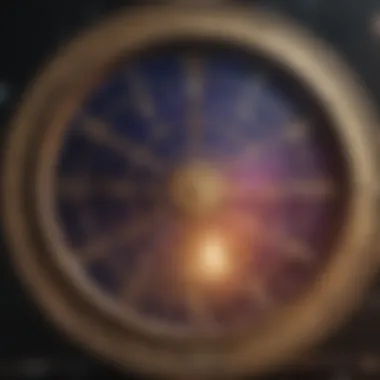How to Determine Your Star Sign: A Complete Guide


Intro
Astrology has intrigued humanity for centuries. For many, understanding their star sign is a first step into this complex field. Your star sign relates to your date of birth and plays a crucial role in astrological assessments. It offers insights into personality, relationships, and even life challenges. In this article, we will explore various methods to determine your star sign, delve into the characteristics of each sign, and understand the wider implications of this knowledge.
Zodiac Profiles
Overview of Each Sign
The zodiac consists of twelve distinct signs, each associated with specific dates and covering unique traits. These signs are:
- Aries (March 21 - April 19)
- Taurus (April 20 - May 20)
- Gemini (May 21 - June 20)
- Cancer (June 21 - July 22)
- Leo (July 23 - August 22)
- Virgo (August 23 - September 22)
- Libra (September 23 - October 22)
- Scorpio (October 23 - November 21)
- Sagittarius (November 22 - December 21)
- Capricorn (December 22 - January 19)
- Aquarius (January 20 - February 18)
- Pisces (February 19 - March 20)
Each sign has its own element (fire, earth, air, water) and ruling planet, contributing to their individual characteristics.
Personality Traits
Understanding one’s star sign provides a glimpse into personality traits that influence behavior, emotions, and responses to various situations. For example, an Aries individual is known for being energetic and determined, while a Libra tends to seek balance and harmony. Here are some key traits for each sign:
- Aries: Courageous, adventurous
- Taurus: Dependable, persistent
- Gemini: Adaptable, curious
- Cancer: Intuitive, emotional
- Leo: Confident, charismatic
- Virgo: Analytical, meticulous
- Libra: Diplomatic, fair-minded
- Scorpio: Passionate, resourceful
- Sagittarius: Optimistic, adventurous
- Capricorn: Disciplined, ambitious
- Aquarius: Innovative, independent
- Pisces: Compassionate, artistic
Strengths and Weaknesses
Each sign possesses strengths and weaknesses, providing a well-rounded view of one’s astrological profile. Recognizing these can aid personal development and interpersonal relationships:
- Aries: Strength – leadership; Weakness – impulsiveness
- Taurus: Strength – loyalty; Weakness – stubbornness
- Gemini: Strength – versatility; Weakness – indecisiveness
- Cancer: Strength – caring; Weakness – sensitivity
- Leo: Strength – generosity; Weakness – arrogance
- Virgo: Strength – practicality; Weakness – overcritical
- Libra: Strength – cooperation; Weakness – avoidance
- Scorpio: Strength – intense; Weakness – jealousy
- Sagittarius: Strength – open-minded; Weakness – restless
- Capricorn: Strength – resourceful; Weakness – pessimistic
- Aquarius: Strength – progressive; Weakness – aloofness
- Pisces: Strength – empathetic; Weakness – escapism
Each zodiac sign reflects different qualities, but it is essential to understand that personal experiences also shape one’s character.
Compatibility Insights
Love and Relationships
Astrology offers valuable insights into romantic compatibility. Certain signs are known to pair well together based on shared traits, while others may face challenges. For instance, a Taurus may find stability with a Capricorn but struggle in a relationship with a Libra due to differing emotional needs.
Friendship Compatibility
Friendships can also benefit from astrological knowledge. Signs that share similar elements often connect more seamlessly. Fire signs like Aries, Leo, and Sagittarius might bond over adventures, while earth signs like Taurus, Virgo, and Capricorn may appreciate friendships built on practicality and support.
Workplace Dynamics
Understanding astrological profiles can enhance workplace relationships. Certain traits justify team roles and leadership positions. For instance, a decisive Aries may excel in roles requiring quick action, while a detail-oriented Virgo may thrive in research or analytical positions.
Astrological Events
Monthly/Weekly Horoscope Breakdown


Astrology is dynamic, with various events influencing star sign energy monthly or weekly. Following horoscopes can guide individuals on what to expect and how to prepare.
Notable Celestial Events
Celestial occurrences like full moons, eclipses, and retrogrades generate interest and can significantly impact individual signs. Such events prompt reflection and sometimes transformation.
How to Prepare for Astrological Shifts
Preparation for astrological shifts involves self-awareness and adaptability. For individuals, maintaining a journal can clarify thoughts and feelings during turbulent phases. This practice often leads to personal growth and more harmonious relationships.
By understanding your star sign, you unlock pathways to self-discovery and interpersonal connections. Astrology offers a framework that, if utilized thoughtfully, can enrich lives profoundly.
Understanding Astrology
Astrology has long been a topic of fascination for many. It serves as a framework through which individuals can explore their personalities and understand their roles in the universe. By studying the alignment of celestial bodies at the time of one’s birth, astrology aims to provide insights into a person's characteristics and potential life path. Understanding astrology is crucial because it helps people connect their fate with the movement of the stars.
Astrology enriches many lives by offering perspective and guidance. It invites individuals to reflect on their identities and to recognize patterns in their behavior and relationships. This self-awareness can lead to deeper emotional intelligence and personal growth. The nuances of astrology provide a way to interpret life experiences and make sense of challenges, enhancing an individual’s decision-making process.
In this context, comprehending the fundamentals of astrology can empower enthusiasts to harness this knowledge. Identifying your star sign is just one of the many aspects of this vast discipline. It enables a more structured approach to understanding oneself and others, creating a reliable map of one’s inner universe.
What is Astrology?
Astrology is the study of the movements and relative positions of celestial bodies, and how these phenomena can influence human affairs. This ancient practice has roots in various civilizations, including the Babylonians and Greeks. Astrologers use a person’s birthdate, time, and place to create a natal chart, also known as a horoscope.
The natal chart is a visual representation of the positions of the sun, moon, and planets at the exact moment of birth. Each of these celestial bodies carries specific attributes and meanings. Together, they form a comprehensive picture of one’s personality and potential.
Many people turn to astrology for guidance. By understanding their astrological profile, individuals can uncover deeper motivations and preferences. The insights gained through this can enhance interpersonal dynamics, reveal strengths, and even highlight areas for improvement.
The Role of Zodiac Signs
Zodiac signs hold a central place in astrology. There are twelve distinct signs, each matched to a segment of the year. Each sign is associated with specific traits and characteristics, forming the basis for most astrological interpretations.
The twelve signs are:
- Aries: March 21 – April 19
- Taurus: April 20 – May 20
- Gemini: May 21 – June 20
- Cancer: June 21 – July 22
- Leo: July 23 – August 22
- Virgo: August 23 – September 22
- Libra: September 23 – October 22
- Scorpio: October 23 – November 21
- Sagittarius: November 22 – December 21
- Capricorn: December 22 – January 19
- Aquarius: January 20 – February 18
- Pisces: February 19 – March 20
Each zodiac sign resonates with particular personality traits. For instance, Leo is often seen as charismatic and confident, while Virgo embodies diligence and attention to detail. Understanding these attributes helps in decoding personal behaviors and the behaviors of others.
The Zodiac Calendar
The Zodiac Calendar forms the backbone of astrology, serving as a time-bound framework that dictates the positioning of celestial bodies. Understanding the Zodiac Calendar is essential for those who wish to determine their star sign accurately. Each zodiac sign corresponds to specific dates in the year, representing periods characterized by distinct astrological influences. This calendar aids in identifying not just one's sun sign but also offers insights into other aspects of astrological practice.
Overview of the Zodiac Signs
The twelve zodiac signs are more than mere symbols; they encapsulate a diverse range of personality traits and behaviors. Each sign corresponds to a particular segment of the year, influencing how individuals experience life. Acquainting oneself with these signs may provide a clearer view of personal strengths and weaknesses.


Zodiac signs are divided by elements: Fire, Earth, Air, and Water. Each element embodies certain qualities that manifest in individual personalities. For example:
- Fire: Aries, Leo, Sagittarius – known for enthusiasm and action.
- Earth: Taurus, Virgo, Capricorn – associated with practicality and stability.
- Air: Gemini, Libra, Aquarius – connected to intellect and communication.
- Water: Cancer, Scorpio, Pisces – often deemed intuitive and emotional.
Understanding these elements can empower individuals to assess their traits or even navigate relationships more adeptly.
The Twelve Signs and Their Dates
The twelve signs of the zodiac and their respective dates play a crucial role in astrology. Here is a brief overview:
- Aries: March 21 - April 19
- Taurus: April 20 - May 20
- Gemini: May 21 - June 20
- Cancer: June 21 - July 22
- Leo: July 23 - August 22
- Virgo: August 23 - September 22
- Libra: September 23 - October 22
- Scorpio: October 23 - November 21
- Sagittarius: November 22 - December 21
- Capricorn: December 22 - January 19
- Aquarius: January 20 - February 18
- Pisces: February 19 - March 20
By recognizing these dates, individuals can accurately ascertain their zodiac sign based on their birthdate. This understanding paves the way for further exploration into one's astrological profile, including the moon and rising signs.
Understanding Cusp Signs
Cusp signs are those individuals born on the transition days between two zodiac signs. This positioning often leads to traits from both signs, resulting in a more complex personality. For example:
- A person born on the last day of Aries and the first day of Taurus might display both the assertiveness of Aries and the practicality of Taurus.
Recognizing whether you fall on a cusp can provide additional layers of insight into personal characteristics. Many astrologers advise cusp individuals to explore both signs in depth to fully understand their astrological influences.
Understanding your zodiac sign is crucial for self-awareness and personal growth. Delving deeper into astrological elements can reveal hidden aspects of your personality.
Determining Your Star Sign
Understanding one’s star sign is a fundamental aspect of astrology. The star sign, often associated with personality traits, emotional tendencies, and even life paths, has captured the interest of many individuals. This article segment will navigate through various methods to determine your star sign, emphasizing the importance of accurate calculations and broader contexts. Recognizing your star sign can offer deeper self-awareness and enhance personal growth. Here, we focus on three key elements in this process: your birthdate, various astrological calculations, and the significance of looking beyond the sun sign.
Using Your Birthdate
Your birthdate is perhaps the primary way to find your star sign. Each zodiac sign corresponds to specific date ranges; thus, identifying your sign begins with knowing when you were born.
- Most astrological sources outline the date ranges for each sign clearly. For instance, if you were born between March 21 and April 19, your sun sign is Aries. This method is straightforward, yet it demands precision.
- Note that the exact transition from one sign to another can vary slightly due to yearly astronomical factors. Therefore, verifying your birthdate against more comprehensive astrological data could be beneficial.
- Additionally, consider the time and location of your birth too. Fluctuations based on these factors can determine if you are on the cusp of two signs, leading to different astrological implications. Hence, confirm your details via reputable astrology resources and databases.
Astrological Calculations and Tools
Astrology offers an abundance of calculations and tools designed to refine one's understanding of the star sign.
- Natal Chart: This tool is a map of celestial bodies based on the exact time and place of your birth. It reveals not only your sun sign but also your moon sign and rising sign. These elements create a more nuanced picture of your astrological profile. Using websites or apps that allow custom natal chart generation can produce insightful results.
- Astrological Software: A variety of software programs exist to help with detailed calculations. They often provide insights into transiting planets, aspects, and other factors which can influence your life at different times.
- It is essential to utilize accurate tools since erroneous calculations can lead to incorrect astrological readings. Rely on established resources, such as astrology databases or well-reviewed astrology software apps.
Looking Beyond the Sun Sign
While the sun sign is popular in discussions about astrology, there's more to consider. Exploring beyond your sun sign reveals deeper personality layers and enriches your astrological understanding.
- Moon Sign: Your moon sign governs your emotional landscape. It reflects your inner self and emotional responses. Knowing your moon sign helps identify how you process feelings, which complements the more public persona designated by your sun sign.
- Rising Sign: Also known as the ascendant, this sign represents your outward behavior and how others perceive you. Understanding your rising sign allows for greater insight into your first impressions on others.


Common Misconceptions
Understanding common misconceptions is crucial when exploring the realm of astrology. Many people have a surface-level interpretation of star signs, only recognizing the basic traits associated with each sign. This simplistic view can lead to misunderstandings about their significance in astrology. Such misconceptions can negate the potential benefits of deeper self-discovery and personal growth through astrological insights.
Star Signs and Personality
One prevalent misconception is the belief that star signs determine one's entire personality. While zodiac signs can offer insightful traits and tendencies, they do not rigidly define who a person is. Each sign comes with its strengths and weaknesses, yet the individual variability shaped by experiences, environment, and other factors plays a significant role.
Understanding one's star sign can enhance personal self-awareness. For instance, someone born under Taurus is often viewed as stubborn and practical, but they can also be deeply caring and affectionate. Recognizing both the positives and the negatives allows for a more nuanced understanding of oneself and others.
The complexity of personality means that zodiac signs are just one lens through which to view human behavior. Other aspects of an individual's astrological chart, such as the moon sign and rising sign, also contribute to personality. Therefore, it is essential to examine the entire chart for a more comprehensive picture rather than relying solely on the sun sign.
The Influence of Other Celestial Bodies
Another key misunderstanding involves the belief that only star signs influence one's life and character. This overlooks the significant roles played by other celestial bodies, such as the moon and planets. For instance, a person's moon sign represents their inner self, emotions, and instincts. It provides insights into how they react to their environment on a subconscious level.
Additionally, planets like Mercury, Venus, and Mars affect communication styles, love life, and assertiveness in daily life. Each planet influences a different area, which can modify traits associated with a star sign. It is essential to understand that astrology is a multi-dimensional field, and focusing only on sun signs reduces this complexity into a flat narrative.
Astrological insights go beyond just the sun sign; they encompass a rich tapestry of celestial influences.
Recognizing these nuances helps individuals to appreciate astrology's depth, promoting a more informed perspective on personal growth, relationships, and decision-making. It encourages a holistic approach rather than a narrow viewpoint, facilitating greater understanding and application of astrology in one's life.
Practical Applications of Star Sign Knowledge
Understanding your star sign extends beyond mere identification; it plays a vital role in various aspects of personal development and interpersonal dynamics. By applying this knowledge practically, individuals can achieve deeper self-awareness, enhance relationships, and navigate life choices more effectively. The importance lies in recognizing the broader implications of astrological insights in daily life. Here are several key facets to consider:
- Self-Discovery: Knowledge of one's star sign assists individuals in understanding personality traits, strengths, and weaknesses. It serves as a tool for introspection, allowing individuals to explore their motivations and behaviors. This self-discovery can lead to growth and improved mental well-being.
- Relationship Compatibility: Astrology offers insights into compatibility between individuals based on their star signs. Understanding these dynamics can help navigate personal relationships more successfully. Whether in friendships, romantic partnerships, or workplace interactions, astrological insights can provide a roadmap for harmony or highlight potential challenges.
- Decision-Making: Utilizing astrological knowledge can aid in making informed choices. Individuals can use their understanding of planetary influences to decide on activities, timing, or even significant life changes. Whether it is planning a business endeavor or reflecting on personal goals, reconciling decisions with astrological timelines can enhance outcomes.
“Astrology can help you see larger patterns at play in your life.”
These practical applications of understanding one’s star sign emphasize the importance of astrology as a lens through which individuals can view their lives more clearly. This understanding creates an opportunity for intentional actions aligned with personal values and ethics. As such, embracing astrology is more than a curiosity; it becomes a tool for navigating the complexities of life.
Epilogue
Astrology is a multifaceted system that reveals insights about oneself. Understanding your star sign is important for various reasons that extend beyond mere curiosity. It plays a vital role in self-awareness and aids individuals in exploring their motivations, strengths, and challenges.
The Importance of Understanding Your Star Sign
Grasping the essence of your star sign offers clarity about your inherent traits and behavioral patterns. Each zodiac sign carries unique characteristics that can shape how one navigates life. By knowing your star sign, you may better understand your emotional responses and social interactions.
Additionally, the star sign serves as a guide that can illuminate pathways for personal growth. For instance, someone's astrological makeup could help in recognizing recurring patterns in relationships or decision-making processes. Furthermore, it can foster self-acceptance by highlighting strengths and areas for improvement.
"Understanding your astrological profile can enable you to align with your true self."
Encouragement for Further Exploration
Exploring astrology leads to a richer understanding of oneself and others. Many resources exist for those who wish to delve deeper into their astrological profiles. Consider exploring your moon sign, rising sign, and other celestial bodies that influence you. These components can enhance your comprehension of your personality traits and behaviors.
Astrology is not merely a tool for fortune-telling; it can provide valuable life insights and help develop emotional intelligence. Engaging with astrological texts, communities, and discussions can broaden perspectives and encourage thoughtful reflection.
In a world where self-discovery is paramount, embracing astrology may lead to a more profound understanding of life experiences. The journey of understanding one's star sign opens doors to personal exploration and enriches interactions with others.



